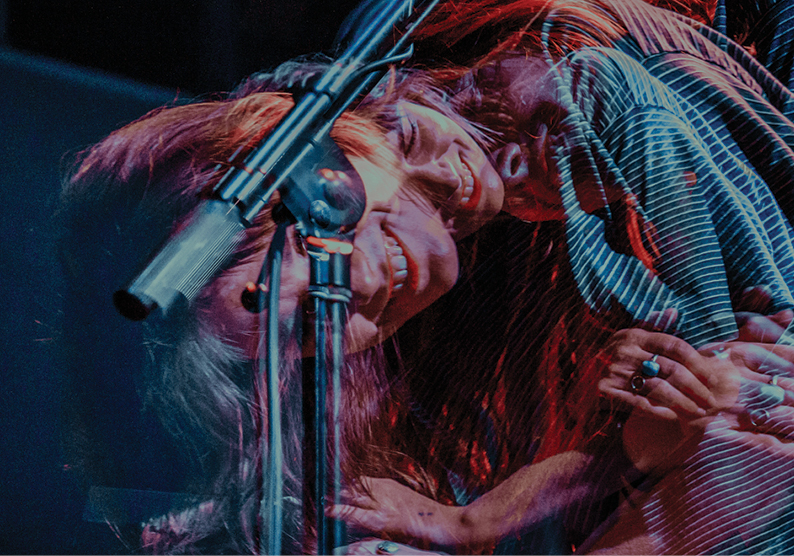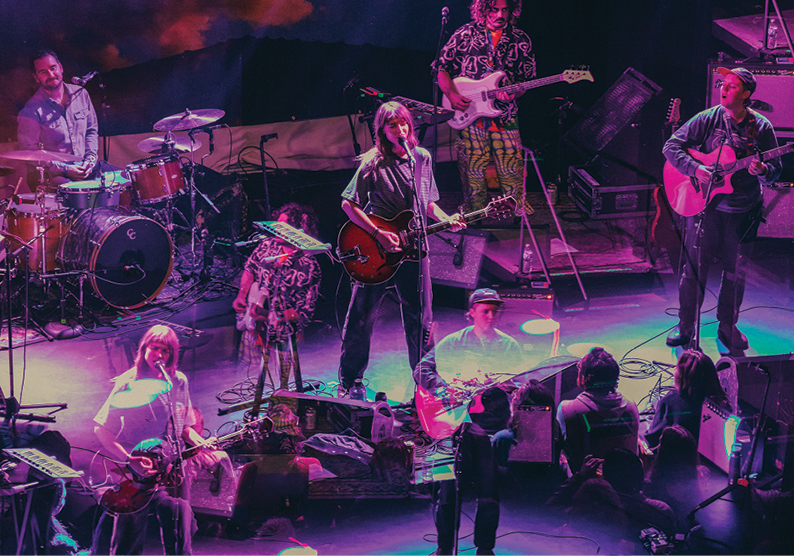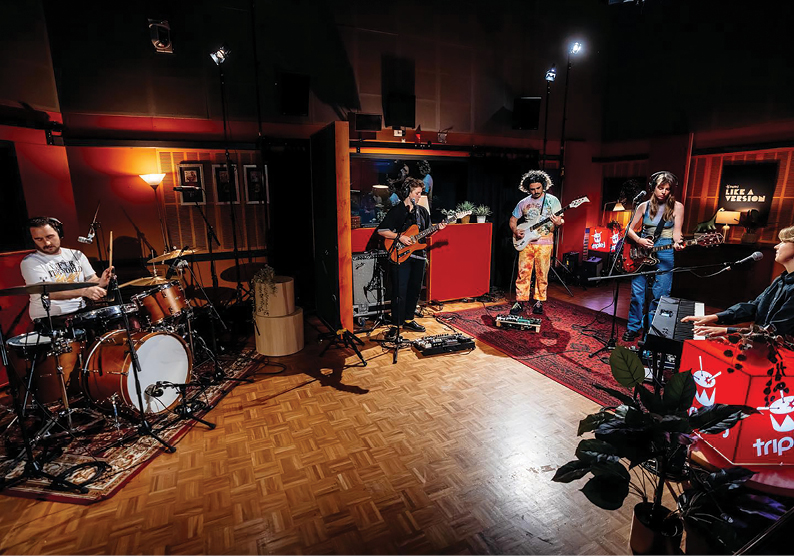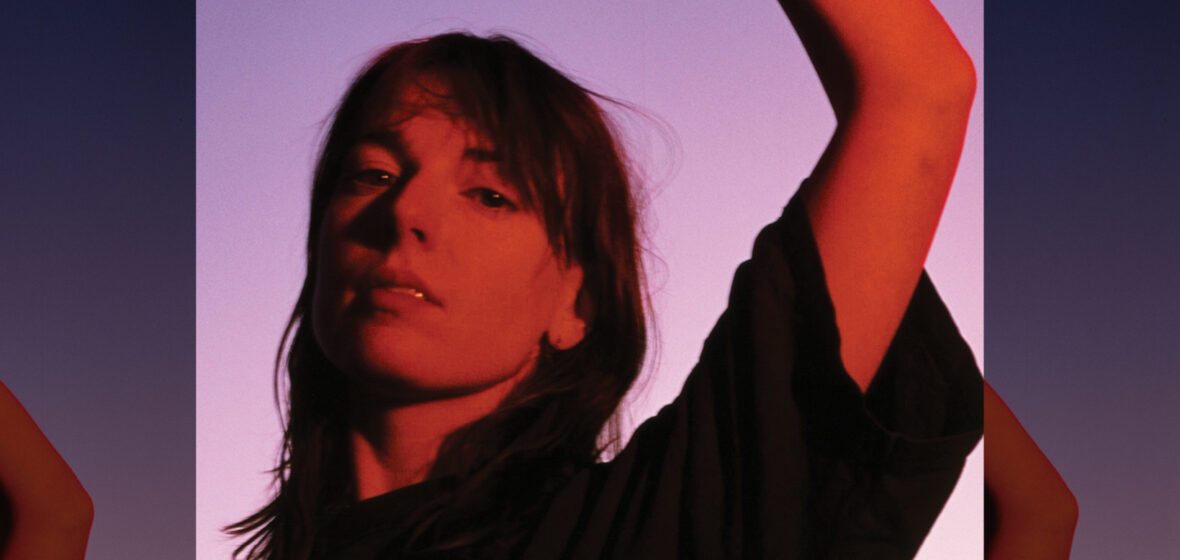Australian singer-songwriter Angie McMahon’s latest album maps her personal journey to catharsis, exploring her experiences of heartbreak, anxiety, and depression. The result is an astounding lyrical achievement, in which anyone can see themselves between her lines.
Angie McMahon is a big believer in the power of affirmations. The Melbourne-based singer confesses that moments before this interview, she felt too enervated to speak and had to reassure herself in the mirror, repeating, “You’re strong; you’ve got this.”
“It’s like casting a spell in your mind,” the softly-spoken singer-songwriter tells the Journal from her home in Melbourne, where she is taking shelter from the cool autumnal evening.
“I was reading some books about the psychology of the subconscious and learnt how hard we are on ourselves automatically. I would often catch myself speaking negatively and shutting doors on myself.”
In what was a particularly bleak but lyrically abounding time for the 30-year-old singer, McMahon turned to listening to self-empowerment affirmations in the morning and before she went to sleep to try to cognitively reframe her negative thinking patterns.
“I was living alone at the time, which was great because there was no one there to make fun of me,” she says, laughing.
“I was honestly worried about the ‘lame’ element of putting affirmations into my songs but singing them as I wrote them felt so powerful. They almost serve as an intention to tell me what I need to hear; a way to reparent and regulate myself through songwriting.”
The songs from the singer’s latest album, Light, Dark, Light Again, released last October, are laced with affirmative mantras. In the anthemic ballad ‘Letting Go’, McMahon cradles her listeners, reminding them to embrace failure and relinquish control: “It’s okay, it’s okay. Make mistakes, make mistakes.” In the song ‘I Am Already Enough’, she sings with grounding self-assurance: “I am a living, breathing Earthling. I am already enough. I am already enough.” And in ‘Saturn Returning’, she makes a vow to herself: “I’m gonna love every inch of this body” before “surrendering her keys to the universe.”

The singer has now come full circle. After writing these lyrics in a dark period of solitude, she has been hearing them sung back to her by fans during her Making it Through album tour. Her eyes noticeably dilate as she speaks about the unparalleled joys of performing live again.
“I really missed playing live shows,” she admits. “It feels so special to have that opportunity to connect with people through the record. I think I am still processing all the sad and heavy stuff from that time after spending so much time with the music alone. But it’s such a relief to be on the other side, releasing it all.”
Angie McMahon grew up alongside three other siblings in Fairfield, an inner suburb of Melbourne. She attended a private Catholic girls’ school where she took piano and trumpet lessons and taught herself how to play guitar. Music reverberated in every corner of the McMahon household, with car rides soundtracked with the eclectic likes of k.d Lang, Bob Dylan, Missy Higgins, Joni Mitchell, Bruce Springsteen, and Meatloaf.
“It was a very broad-reaching selection of stuff,” McMahon says, smirking.
In recent years, the singer has reflected on her formative years with a fresh pair of eyes after learning she is queer and has attention-deficit/hyperactivity disorder (ADHD). She remembers being very “insular” and how songwriting and singing began her outlet to “express and process” everything. She got her first taste of the stage in her late teens, playing in a nine-piece soul project called The Fabric and even won a Telstra competition to open for Bon Jovi on the Australian leg of his Because We Can tour.

Being a member of The Fabric was a huge learning curve for the artist, but she found being a woman in such a male-dominated troupe “frustrating”.
“I was 19 and in a band of eight other guys who weren’t particularly well-versed in gender politics,” she says.
“I mean, I wasn’t really either but it did push me to go and do my own thing. I think the only reason I ended up doing something under my own name was after an experience of being in such a big collective; I just wanted more control.”
In 2017, McMahon made her breakout as a solo artist after releasing the alt-rock-folk singer ‘Slow Mover’. It was an instant hit, certified double platinum by the Australian Recording Industry Association, and has since had more than 33 million streams on Spotify. The chorus hook lyric, “Try set me on fire. Try set me on fire”, continues to be belted out with righteous indignation by her fans at her concerts worldwide.
The story behind the smash hit was inspired by a string of “situationships” McMahon had in her early twenties. “If I think back to writing the song,” she ruminates, “it was about wanting to feel excited about somebody.”
“I had yet to really fall in love, and I guess I was hoping it wasn’t me, that I was lacking in appeal. I had this loop of fire inside of me but no one to devote it to, and I was left longing for something deeper. I was also raised a Catholic, and I feel I’m still shedding all of my repressed desires, so I couldn’t really sing ‘Try turn me on’. I tried to be poetic about it.”
‘Slow Mover’ featured on her critically acclaimed 2019 debut album Salt, which reached number five on the ARIA charts and won Best Independent Rock Album at the AIR Awards. The record saw her compared by NPR as a “one-woman Fleetwood Mac”, and she has since shared the stage with everyone from the Pixies, Father John Misty, and Alanis Morisette and has toured with the Irish musician Hozier.
Her track ‘Pasta’ from Salt was also sampled by Fred Again on his track ‘Angie (I’ve Been Lost)’. Considering Fred Again’s messianic-like status in Australasia, what was it like seeing her song invoke new life?

“It’s flattering to be invited into a different genre and to inhabit a different space because I haven’t made music like that,” McMahon says.
“Sometimes you just want to dance, and seeing what people connect with can be elevating. There can be so much joy and release at a show like that.”
When Light, Dark, Light Again was released in October 2023 — four years after the release of her debut album— it felt as if McMahon had published unredacted pages from her private diary – full of tear-stained pages, vents
and confessionals.
Several soul-stirring tracks and thundering instrumental medleys off the album have drawn comparisons with other artists such as Florence Welch, Angel Olsen, Springsteen, and the War on Drugs. Considering McMahon’s sweeping vocals, influences and collaborators, this is unsurprising. For Light, Dark, Light Again, McMahon worked with every ‘Indie Band’s Secret Weapon’ Brad Cook (Bon Iver, the War on Drugs, Whitney and Hiss Golden Messenger) in his Durham, North Carolina studio.
The 13 tracks are a culmination of a fight-or-flight time for the singer. It was 2020, COVID-19 had stopped the world in its tracks, and the state of Victoria had one of its toughest lockdowns. It was during this time that McMahon suffered from anxiety attacks, a relationship breakdown, depression, and a paralysing fear of failure. “I had fully landed at rock bottom”, she reveals. “But I think that needed to happen for me to reclaim who I am.”
In this act of reclamation, she clawed her way out of the darkness and confronted her demons horn-first. “I wanted to recognise all the sorrow and hardship there is in life, and sometimes you have to sit in it but not let it be the driving force,” she affirms.
“It’s an acceptance that dark is part of the cycle and trusting you will get out the other side.”
She put pen to paper and wrote candidly about weaning herself off antidepressants (‘Serotonin’), drinking too much alcohol (‘Fireball Whisky’), self-destruction (‘Staying Down Low’) and relinquishing control to the cosmos (‘Saturn Returning’). The result is a rich tapestry threaded by raw, redemptive, reassuring tracks.
The opening track, ‘Saturn Returning,’ sets the tone for what is indisputably a cosmic cluster of songs. McMahon believes she hit her ‘Saturn Return’, an astrological phenomenon that allegedly brings up significant change as the planet Saturn returns to the same position it was when you were born, when she was 27.
“I fully believe in it,” she attests. “We are so arrogant to think we are unaffected by the universe and the planets. I honestly thought I was going to die at one point, but it was so important to go through it and get to come out of it the other side as a new version of yourself.”
McMahon is light-hearted when she references her upbringing and how this may have manifested into a lot of ‘guilt’ and ‘shame’. These days, she opts for a more spiritual path, and has waxed lyrical about how the teachings of the Tibetan-Buddhist scholar Pema Chödrön helped her make sense of vulnerability and how you need to hit an all-time low before moving on. Hence the raw lyrics in the ‘Divine Fault Line’ track off the album: “You’re on your own dark side of the border tonight. And you’re all f–ed up, and you’re wantin’ to die. And that’s the place where the breaking out begins. It’s the divine-fault opening.”

In addition to using her songs to empower both herself and her listeners, the singer uses her platform to address social and environmental issues. Her reinterpretation of Australian Crawl’s ‘Reckless’ for triple j’s Like a Version sees her instil it with a critical message about climate change, singing: “Another natural disaster fries the Great Barrier Reef.”
During ABC’s New Year’s Eve coverage, she covered Sinead O’Connor’s ‘Nothing Compares To You’ before saying: “Palestinians should be free.’ ABC faced a backlash, with many viewers slamming the broadcaster for letting the musicians make political statements. Does she care if speaking out lands her in troubled water?
“I’m on my phone a lot of the time, and it’s hard to ignore everything that is going on in the world, and I don’t want to,” she confidently states. “I think it does piss people off when musicians talk about that stuff, but it also gives me hope to see students on campus and other artists speaking up for people.”
She continues: “It’s also a good challenge for me to recognise my privilege. It probably has to do with the fact that I was brought up alongside activists. I think this job involves a lot of ego, which I have struggled with, but it’s pretty easy to balance that out by using a platform for other people too … We can learn a lot from one another. It’s important to listen.”
As her popularity continues to proliferate, maintaining her authenticity as an artist has been a struggle and something McMahon is still “figuring out.” “I think fear of failing was driving me away from making good art,” she reflects, “but I’ve since learned to stick to my values and to operate at my own pace. If it all stops working and the industry eats me up, and I have to find a different job, I know on a deeper level that I’ll be fine. That is a liberating feeling.”
Light, Dark, Light Again is the Australian singer-songwriter’s journey to catharsis, where she delves into her own experiences of heartbreak, anxiety and depression to write songs where anyone going through a troubled time can find themselves between the lines. Does she have any advice for those who might be struggling?
“I think one of the biggest lessons I’ve learnt is to ride the wave, allow the outpour and release it,” she concludes. “And to trust that after that, you will be able to find calm again.”
Or if all else fails, try giving yourself a pep talk in the mirror.




